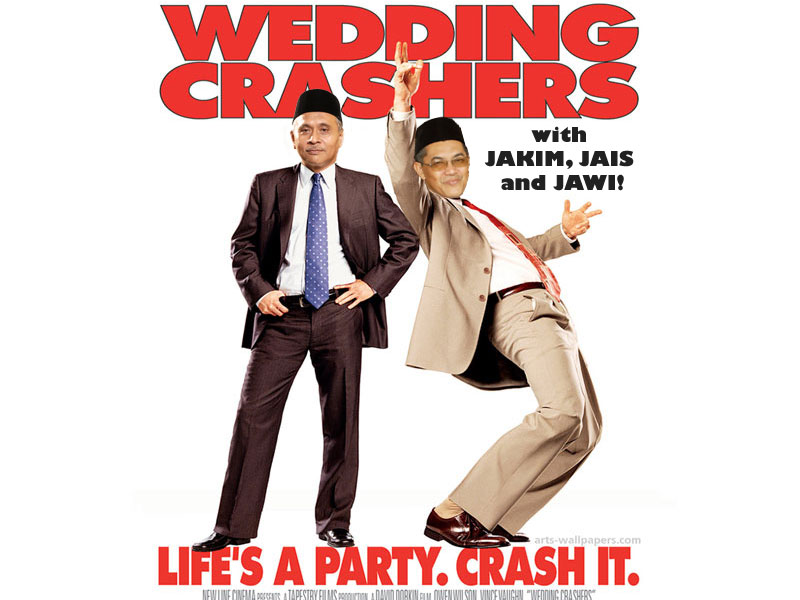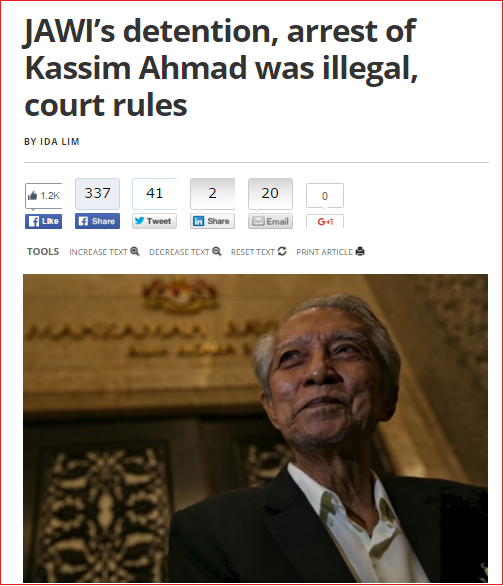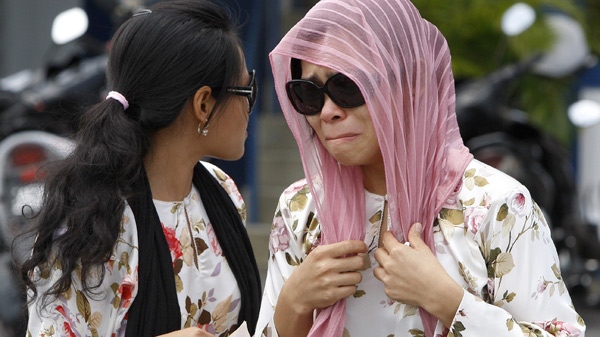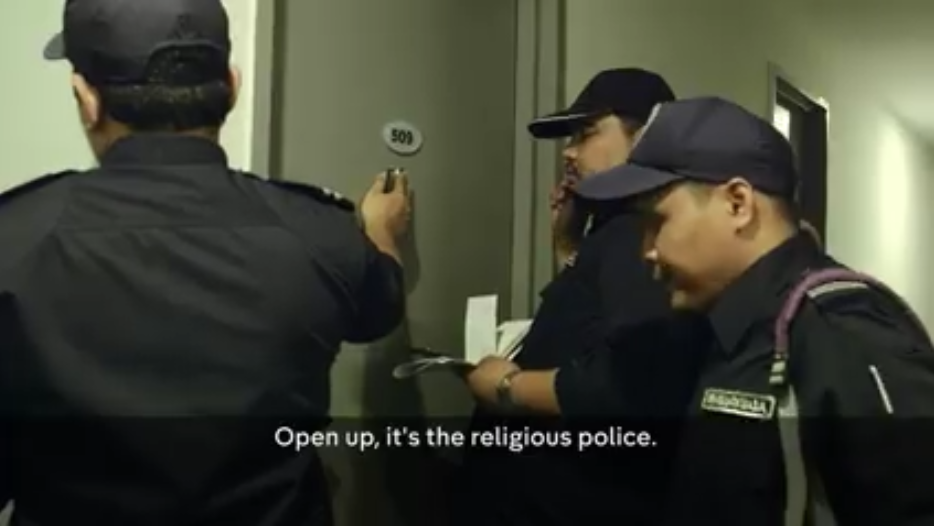[UPDATED: 3rd July 2017] Actually… How much POWER do religious authorities have in M’sia?

- 3.9KShares
- Facebook3.9K
- LinkedIn9
- Email7
- WhatsApp21
On 3rd April, the Federal Territories Islamic Department (JAWI) raided a fundraising dinner organised by the transgender community at Renaissance Hotel. Supposedly it held a ‘beauty pageant’ – and pageants are haram based on a fatwa – when it fact it was just a fashion show where they wore international costumes. Click here for a short video clip to watch the incident. They arrested Ira Sophia whom they alleged organised the event, as well as human rights lawyer Siti Kasim, but Siti was released shortly after.
Lalita Abdullah the Exco Member of transgender rights group SEED Foundation, reported that JAWI officials detained Ira for almost 24 hours! And despite Siti repeatedly asking the officials for an arrest warrant during the raid (as seen in the video clip), they didn’t produce one. Now they will be charging Ira under the Syariah Criminal Offences Act – Section 9 for defying religious authorities and Section 25 for encouraging vice.
[UPDATE: 3rd July 2017]
Over a year later, on the 13th of June 2017 the High Court compelled JAWI to provide Siti Kasim with the names of the JAWI officers who were in charge of the raid. This was done following an application filed by Siti for the purposes of suing JAWI for her unlawful arrest back then – explained later in this article.
However, a few hours after that decision, Siti received a call from the Dang Wangi police station, telling her that she will be charged under Section 186 of the Penal Code. This section deals with the obstruction of public servants from doing their duties, which may cause
“…imprisonment for a term which may extend to *two years or with fine which may extend to *ten thousand ringgit or with both.” – Section 186, Penal Code.
The impeccably-timed charge brought a negative reaction from both the Human Rights Commission of Malaysia (SUHAKAM) and the Malaysian Bar, as the charge is seen as a form of harassment and intimidation towards a lawyer carrying out her duties. Tan Sri Razali Ismail, the chairman of SUHAKAM, had condemned this allegation, stating that:
“…when lawyers are unable to defend their clients for fear of arrest, criminal charges or intimidation, they cannot properly defend people facing violations of their human rights.” – Tan Sri Razali Ismail, chairman of SUHAKAM for The Star Online.
A court proceeding can get expensive, so Siti Kasim has since requested Freedom Fund’s help to defray some of the expected expenses to defend herself, which includes bail money, incidental expenses and if found guilty, a fine, estimated to cost a total of RM8,000. You can help by donating to the fund according to the details in the image below.

[END OF UPDATE: 3rd July 2017]
Are they allowed to arrest anyone? Can they do it without a warrant? So, we spoke to lawyer Fahri Azzat and Syariah lawyer Nizam Bashir, to find out how much power Malaysian religious authorities actually have. P/S: Fahri has a Diploma in Shariah law and practice, and he can consult but not represent people on it la.
But first, what qualifies as ‘religious authorities’?

Malaysian Muslims prolly know this already, but they would be the Majlis Agama Islam, Jabatan Agama Islam, and Mufti.
“These are often seen as the ‘authorities’. Although it can rightly extend to the Syariah Courts, Judges, etc. but the phrase is used more in reference to those fellas carrying out enforcement.” – Fahri tells CILISOS
Also they are State Government bodies, NOT Federal Government bodies, so each state has its own. The Majlis would be the policy-makers. Then you’ve got the enforcement guys, the Jabatans – like JAWI (Wilayah branch) and JAIS (Selangor), JAINJ (Johor), JAIPP (Penang), and so on. JAKIM is the national body, and the National Fatwa Council is part of them. So think of the Majlis as Parliament and the Jabatan as police.
After that, there’s the Mufti who acts as the Sultan’s adviser on legal aspects. Although there’s no Sultan for certain states, like Melaka (except for this one guy who keeps insisting he’s the Sultan), there’s still a Mufti for ALL states. So they’ll just be adviser to the Yang di-Pertuan Besar/Yang di-Pertua Negeri (representatives of the Agong in the states without Sultan).
Generally they all follow Syariah law, but each state has its variations. If Kelantan wants to go Hudud, doesn’t mean Johor has to as well. The Federal side proposes a model law to standardize it, but states will not follow it to a T.
“That’s why for the Juzaili case – where we challenged the offence to dress like a woman simpliciter – only exists in Negeri Sembilan and Kelantan. The other states have an immorality provision included along with that offence.” – Fahri
Actually they CANNOT arrest people. Only police can arrest people.

That’s why the JAWI, JAIS officers are always bringing the cops along.
There are two types of arrests according to the Criminal Procedure Code (CPC) – with warrant and without. An arrest without warrant can only be done for a seizable offence (serious crime), not for an offence under State laws (ie. Syariah law), said Fahri. A seizable offence is any offence under the Penal Code that’s punishable with imprisonment of three years and above, for example, theft.
“Generally, they should do it with a warrant of arrest issued by a lower Syariah Court judge, particularly IF the offence is a a non-seizable offence (ie. has a sentence of less than a year or only with a fine).” – Nizam told CILISOS over email
But wait…Ira is being charged for offences under the Syariah Act – not the Penal Code! So they should NOT have arrested her in the first place. Khalwat, drinking beer, tak puasa, all those are not Penal Code offences.
What about handcuffs? Can they use handcuffs? According to Nizam, they are allowed to, BUTTT is should be a last resort thing…not a routine regimen. Alternatively, it’s better if they ask more guards or armed police to watch a person, rather than handcuff the person. As for detaining, they can detain a person – not MORE than 24 hours – based on Federal Territories Syariah law (Section 22).

We asked Nizam what happens during the investigation, if it’s as dramatic as crime dramas:
“I am a little unsure what you mean by this question, but waterboarding is certainly not allowed. Either way, as far as the statutory provisions go, a person is legally bound to answer all questions put to him by the religious officer.” – Nizam
However, they cannot force an entry into a room. They can only go in when the person opens the door, according to UK’s Channel 4 News documentary. We found an article on Free Malaysia Today, where Nizam concurred, saying this applied to both closed-door and public events. In fact, they can even SUE the religious authorities!
“Broadly speaking, yes, but the individual to be sued will be an interesting issue for the courts to deliberate upon.” – Nizam Bashir, Syariah lawyer, quoted from FMT
Can JAWI or other religious authorities be punished for misusing arrest powers? Yes, they can! Here’s an example: In December last year, 82-year-old Kassim Ahmad from Kedah was arrested by JAWI (for insulting Islam and defying religious authorities at a seminar, but Kassim pleaded not guilty).
Kassim was forcibly brought all the way to the Federal Territories by plane aaand detained for MORE than 24 hours. The Court of Appeal ruled what they did to Kassim as ILLEGAL, coz firstly, they crossed state borders to arrest him and by right they had no business to masuk campur in another state’s citizen. Secondly, coz they are not allowed to detain him more than 24 hours.

So the outcome was they awarded him RM20,000, which would come out of JAWI’s pocket and Fahri told us disciplinary action would be taken against the officers internally. Must know your rights and the limits of their powers la when kena tangkap by police – religious or not.
Looking at it from the Quran’s perspective, activist and documentary director Norhayati Kaprawi said, if the religious authorities step out of line by arresting people without following standard operating procedures and if they have no proof people were doing something wrong in the eyes the law, the punishers themselves should get a bigger punishment, by right. Here’s what she posted publicly on Facebook:
“Contoh yang paling jelas dan semua orang tahu ialah kalau dalam kes tangkapan zina. Al-Qu’ran menetapkan mesti ada sekurang-kurangnya 4 saksi dan mereka hendaklah melihat dengan mata kepala mereka sendiri penetration act itu.
Ok, yuk tengok apa Islam kata kalau si ‘pencegah maksiat’ yang telah menuduh zina itu tidak patuhi SOP [standard operating procedure], seperti tak cukup 4 orang, atau mereka tak nampak betul-betul penetration act itu – maka Islam kata si ‘pencegah maksiat’ itu pula yang akan dihukum sebat dengan 80 kali sebatan. Ini dipanggil sebagai hukuman qazaf.” – quote from Norhayati Kaprawi on her Facebook and used with her permission
BUT they have the power to jail not more than 3 years and cane up to 6 strokes

We’re sure you guys remember the case of Muslim model Kartika Sari Dewi Shukarno was sentenced to six strokes of the rotan and an RM5,000 fine for drinking beer. One day before she was supposed to be caned, the Sultan of Pahang cancelled the sentence.
Syariah Courts only handle matters involving Muslims and generally can only pass sentences of not more than three years imprisonment, fine of up to RM5,000, and/or up to six strokes of the cane. (Yep, looks like Kartika got the maximum of combined punishments, except for the jailing.)
But in Malaysia there is still a hierarchy for courts. One type is the standard civil courts (eg. Magistrates Courts, Sessions Courts, High Courts, Court of Appeal and Federal Court). They memang exist because they are in the Constitution. No need to pass State Enactment (a State law) or Act of Parliament to have them.
Syariah Courts on the other hand MUST have a State Enactment. If none is passed, there can be no Syariah Court. It is entirely possible to NOT have a Syariah Court or Islamic Administration.
“If by some reason Selangor State Assembly is 100% Chinese and they revoke all the Islamic Admin Enactments. Ka boom. The end. Finito. No more Islamic Admin in Selangor. But you cannot do that with the civil courts. Also, civil courts have the power to review ANY inferior court, be it Syariah, Industrial, etc.” – Fahri
So for instance, in Kassim Ahmad’s case, the Judge ruled that his rights under Article 5 of the Constitution, which is the right to life and liberty, was violated with his overnight detention and when he was denied access to lawyers. That’s why he got his compensation.
So if they try to arrest anyone, here’s what to do…

Fahri’s advice would be first of all, ask them to show their authority. Nizam told us that would be the ‘kad kuasa jabatan agama’.
If it’s only religious officers, walk away coz they have no powers to arrest on their own without the police. And then ask arrest on what grounds, and which office you will be taken to. ASK FOR A LAWYER, same like in any police arrest. Remember that detention is only a maximum of 24 hours.
Or in Kassim Ahmad’s case, take legal action against them if they go beyond their powers!

At the end of the day, the sentiment as we understand from Fahri, is that there are some people who are starting to become tired of the religious police. There’s a spectrum of opinions now where some people are beginning to see past their nonsense, according to him.
Other instances of people speaking openly against the religious authorities was last November when lawyer Eric Paulsen’s was arrested over a tweet, when an independent preacher Wan Ji Wan Hussin criticised JAKIM in January last year for tarnishing the image of Islam with its narrow-mindedness.
Even Tun Dr. Mahathir said last year that JAKIM wanted everyone to follow “its version of Islam and doesn’t want people to think”, reported The Star. And if people want to remove JAKIM, or any other government body, said Tun M, they could coz Malaysia izz demokrasi.
“Criticising Jakim is a healthy thing. This is because it presents a good image of Islam, in that people will understand that any statement made by JAKIM does not necessarily represent Islam. At least it gives the impression that Islam and JAKIM are two separate things.” – Wan Ji, an independent preacher, The Malay Mail Online
- 3.9KShares
- Facebook3.9K
- LinkedIn9
- Email7
- WhatsApp21




